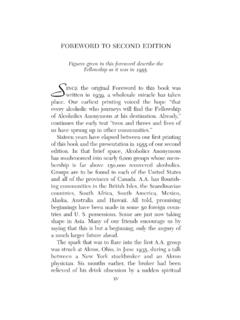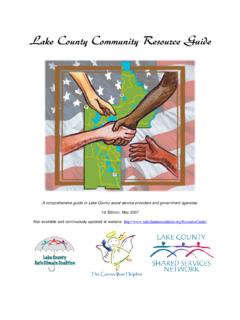Transcription of Summary report of the meeting with nongovernmental ...
1 Geneva, 24 and 25 November 2008 report from a roundtable meeting with nongovernmental organizations and health professionals on harmful use of alcohol report from a roundtable meeting with nongovernmental organizations and health professionals on harmful use of alcohol Geneva, 24 25 November 2008 Department of Mental health and Substance Abuse World health organization World health organization 2009 All rights reserved. The information contained in this publication may be freely used and copied for educational and other non-commercial and non-promotional purposes, provided that any reproduction of the information be accompanied by an acknowledgement of WHO as the source.
2 Any other use of the information requires the permission from WHO, and requests should be directed to World health organization , Department of Mental health and Substance Abuse, 20 Avenue Appia, 1211 Geneva 27, Switzerland. The publication can be downloaded on WHO`s web site: The designations employed and the presentation of the material in this publication do not imply the expression of any opinion whatsoever on the part of the World health organization concerning the legal status of any country, territory, city or area or of its authorities, or concerning the delimitation of its frontiers or boundaries. The mention of specific companies or of certain manufacturers products does not imply that they are endorsed or recommended by the World health organization in preference to others of a similar nature that are not mentioned.
3 Errors and omissions excepted, the names of proprietary products are distinguished by initial capital letters. The views expressed in this publication are those of the participants in the meeting and do not necessarily represent the stated views or policies of the World health organization . The authors only are responsible for their submissions, and the readers only are responsible for the interpretation of these submissions, whether edited or not. The World health organization does not warrant that the information contained in this publication is complete and correct and in no event shall the World health organization be liable for any damages arising from the use of the publication. The World health organization accept no responsibility whatsoever for any inaccurate advice or information that is provided by sources reached via hyperlinks in this publication or by linkages or reference to this publication.
4 Contents Executive report of the 3 .. 3 1. Opening of the meetingImplementation by the WHO Secretariat of World health Assembly resolution Strategies to reduce the harmful use of alcohol ..3 ..4 4 2. Statements from representatives of organizations and 4 3. Reducing the harmful use of alcohol in selected health sector Community Drink-driving policies and Marketing of alcoholic Harm Reducing the public health impact of illegal and informal Other comments4. Exploring means for more structured and systematic interaction between civil society organizations and the WHO Secretariat at global 8 .. 9 5. Concluding 9 Post ROUNDTABLE meeting with nongovernmental ORGANIZATIONS AND health PROFESSIONALS III.
5 13 Annex 1. Scope and Annex 2. Annex 3. List of Annex 4. Strategies to reduce the harmful use of alcohol (resolution )..23 Annex 5. Introductory Statement on behalf of Al-Anon Family Statement on behalf of Alcoholics Statement on behalf of Alcohol Policy Youth Statement on behalf of Asia Pacific Alcohol Policy Statement on behalf of The Canadian Centre on Substance Statement on behalf of Statement on behalf of the Global Alcohol Policy Statement on behalf of the International Council of Statement on behalf of International Federation of Medical Students' Statement on behalf of International Network on Brief Intervention for Alcohol Statement on behalf of International Society for Addiction Statement on behalf of IOGT Statement on behalf of Lions Clubs International Statement on behalf of
6 World Medical Statement on behalf of Worldwide Organisation for Annex 6. Statement on Statement on behalf of EurocareAnnex 7. Statement on community action to reduce the harmful use of ..43 Statement on behalf of Statement on behalf the Global Alcohol Policy Annex 8. Statement on drink-driving policies and Statement on behalf of Annex 9. Statements on marketing of alcoholic Statement on behalf of Statement on behalf of the Global Alcohol Policy Annex 10. Statements on harm Statement on behalf of Eurocare IV GENEVA, 24 AND 25 NOVEMBER 2008 ..Executive Summary The meeting reported in this document was part of a broad consultation organized by the World health organization (WHO) for preparation of a draft global strategy to reduce the harmful use of alcohol.
7 The meeting was chaired by Dr Benedetto Saraceno, Director of the Department of Mental health and Substance Abuse at WHO. The aim was to determine how nongovernmental and health professional organizations can contribute to reducing the harmful use of alcohol by advocacy, the health sector response, community action, drink-driving policies and countermeasures, marketing of alcoholic beverages, harm reduction and reducing the public health impact of illegal and informal alcohol. The group also discussed ways of achieving more structured interactions at global level between the WHO Secretariat, nongovernmental organizations and health professionals.
8 Representatives of 27 organizations and associations participated in the round-table meeting with members of the WHO Secretariat, and participants made short, general statements on behalf on 15 organizations. The main points made by nongovernmental and health professional organizations concerning their contributions to reducing harmful use of alcohol are as follows: Advocacy The essential elements of their work in this area are a message and a structure for delivering the message in a timely, effective manner. Key messages to be communicated include reducing the harm of alcohol, increasing awareness and commitment to change and implementing an effective strategy.
9 WHO should address the contentious issues of harm versus benefits and examine guidance for low-risk drinking. The organizations are committed to increasing governments understanding of the scale of the problem and the actions required to reduce harm. Grass-roots engagement is essential for advocacy. The organizations need to build capacity at regional level and promote interaction among regional and local actors. WHO should encourage Member States to engage with nongovernmental organizations and the health professions. The formulation of WHO guidelines for monitoring the harm caused by alcohol would be helpful for the organizations.
10 WHO should develop training modules to help the organizations build capacity, in particular in countries with few resources. health sector response The organizations, with support from WHO and Member States, will increase the knowledge base of all health workers and promote screening for alcohol problems. They will promote a sector-wide approach for addressing alcohol problems. Brief interventions are well accepted as effective by health professionals, but more attention is needed to other forms of treatment. Treatment is only part of an overall strategy. health professionals should clarify the link between individual problems and public health alcohol policy.
















